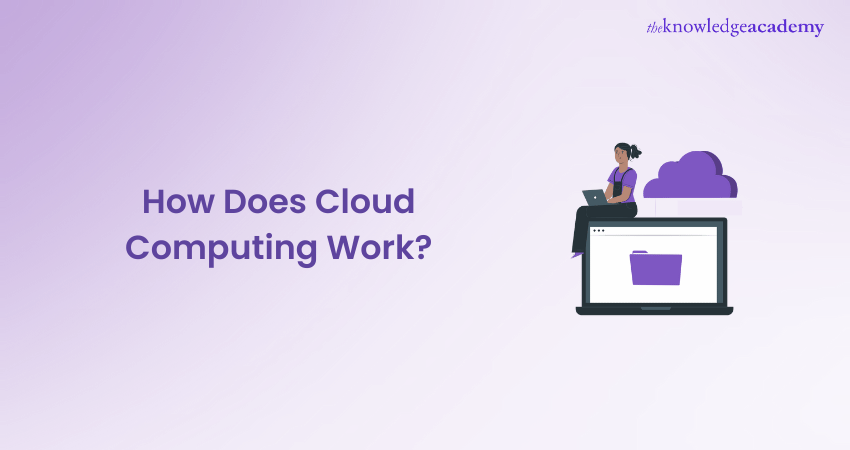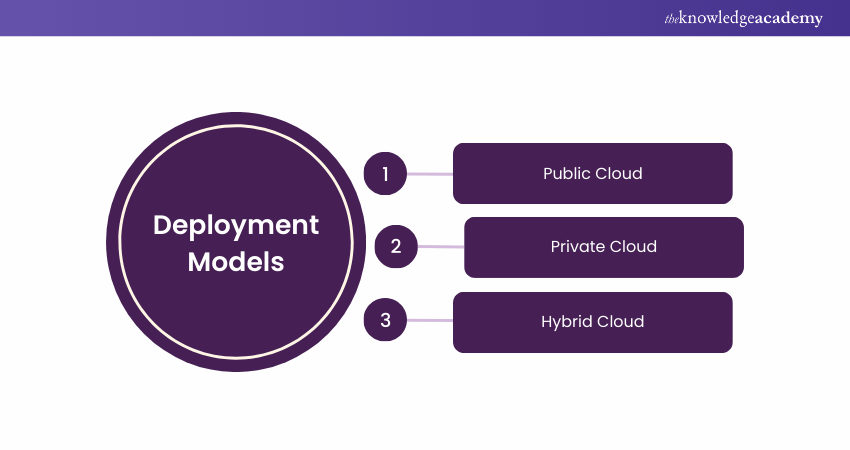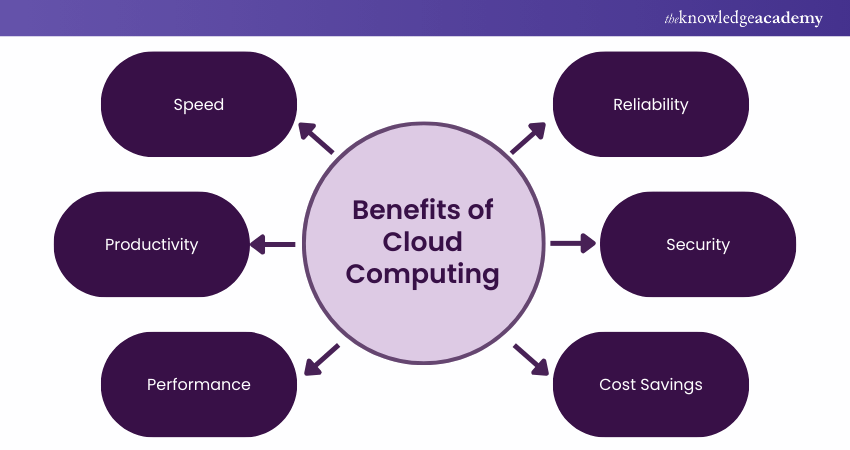We may not have the course you’re looking for. If you enquire or give us a call on +40 316317743 and speak to our training experts, we may still be able to help with your training requirements.
Training Outcomes Within Your Budget!
We ensure quality, budget-alignment, and timely delivery by our expert instructors.

In our fast-paced digital era, businesses face a conundrum: how to meet escalating demands for computing power and storage without breaking the bank on massive hardware investments. Enter the cloud—a game-changer that defies gravity. Imagine this: instead of owning and maintaining your own servers, you tap into a virtual universe of computing resources. But How Does Cloud Computing Work, and why has it become such a game-changer for companies of all sizes? Read on to discover the secrets behind this technological marvel!
So, How Does Cloud Computing Work? Let’s dive into the mechanics behind this revolutionary technology and uncover how it empowers businesses to thrive in the digital age. Whether you’re a tech aficionado or a business luminary, understanding Cloud Computing opens doors to innovation, agility, and a galaxy of possibilities!
Table of Contents
1) What is Cloud Computing?
2) How Does Cloud Computing Work?
a) Types of Cloud Service
b) Deployment Models
c) Key Components and Processes
3) What Are the Benefits of Cloud Computing?
4) Conclusion
What is Cloud Computing?
Cloud Computing is a transformative technology that permits users to access and store data, applications, and services over the internet. It eliminates the need to rely on local servers or personal devices. Cloud Computing uses remote servers to provide on-demand access to data storage and computing power without requiring direct user management.
This technology provides numerous benefits, including flexible resource allocation, cost efficiencies, and the ability to scale services quickly. Businesses can innovate and adapt more easily with Cloud Computing, which supports applications from data storage to advanced analytics and Artificial Intelligence (AI). It has revolutionised company operations, enabling efficient service delivery and agile responses to market demands.
How Does Cloud Computing Work?
Cloud Computing is the delivery of computing services over the internet, commonly referred to as "the cloud." These services include servers, storage, databases, networking, software, analytics, and intelligence. Cloud Computing provides flexible resources, faster innovation, and economies of scale. Here's a breakdown of how it works:
Types of Cloud Services
a) Infrastructure as a Service (IaaS): Provides virtualised computing resources over the internet. Examples include Amazon Web Services (AWS), Microsoft Azure, and Google Cloud Platform (GCP).
b) Platform as a Service (PaaS): Offers hardware and software tools over the internet, typically for application development. Examples include Google App Engine and Microsoft Azure.
c) Software as a Service (SaaS): Delivers software applications over the internet on a subscription basis. Examples include Google Workspace, Microsoft Office 365, and Salesforce.
Deployment Models
The following are the deployment models of Cloud Computing:

a) Public Cloud: Services are delivered over the public internet and shared across multiple organisations. Examples include AWS, Azure, and Google Cloud.
b) Private Cloud: Services are maintained on a private network, often for a single organisation. Offers greater control and security.
c) Hybrid Cloud: Combines public and private clouds, allowing data and applications to be shared between them.
Key Components and Processes
a) Virtualisation: The creation of virtual versions of physical components, such as servers, storage devices, and networks. This allows for more efficient use of physical resources.
b) Data Centers: Large facilities housing numerous servers and storage systems that provide cloud services.
c) Networking: High-speed internet connections and networking hardware facilitate the transfer of data between users and cloud data centres.
d) Automation and Orchestration: Tools and software that automate Cloud Management tasks, such as provisioning resources, scaling applications, and managing workloads.
Transform your career with our expert-led Cloud Computing Training – start learning and advancing now!
What Are the Benefits of Cloud Computing?
Here are the key Benefits of Cloud Computing, summarised in bullet points:

1) Speed: Quick resource provisioning with on-demand access.
2) Productivity: Eliminates routine hardware and software maintenance tasks.
3) Performance: Utilises modern data centres for improved efficiency.
4) Reliability: Facilitates easier data backup and disaster recovery.
5) Security: Offers strong protections against Cyber Security threats.
6) Cost Savings: Reduces capital and operational expenses by avoiding physical hardware investments and ongoing maintenance.
Join our Cloud Computing Training today and elevate your skills to new heights in the tech world!
Conclusion
We hope you enjoyed reading this blog and understood How Does Cloud Computing Work. Understanding this technology is essential to unlocking its potential. It enables efficient resource allocation, scalability, and reliability by utilising virtualisation, load balancing, elasticity, and distributed storage. Embracing this technology empowers organisations and individuals to leverage its benefits and drive innovation in the digital era.
Join our Linux OpenStack Administration Training to become a cloud expert and boost your career prospects!
Frequently Asked Questions

An example of Cloud Computing is Google Workspace, which provides online tools like Gmail, Google Drive, and Google Docs, allowing users to access and collaborate on documents from any device.

Cloud storage works by saving data on remote servers accessed via the internet. These servers are maintained by cloud providers, allowing users to store, manage, and retrieve data from anywhere.

The Knowledge Academy takes global learning to new heights, offering over 30,000 online courses across 490+ locations in 220 countries. This expansive reach ensures accessibility and convenience for learners worldwide.
Alongside our diverse Online Course Catalogue, encompassing 17 major categories, we go the extra mile by providing a plethora of free educational Online Resources like News updates, Blogs, videos, webinars, and interview questions. Tailoring learning experiences further, professionals can maximise value with customisable Course Bundles of TKA.

The Knowledge Academy’s Knowledge Pass, a prepaid voucher, adds another layer of flexibility, allowing course bookings over a 12-month period. Join us on a journey where education knows no bounds.

The Knowledge Academy offers various Cloud Computing, including Cloud Computing Training, Certified Artificial Intelligence (AI) For Cloud Professionals Training and Microservices Architecture Training. These courses cater to different skill levels, providing comprehensive insights into Cloud Computing Salary.
Our Cloud Computing Blogs cover a range of topics related to Cloud Computing, offering valuable resources, best practices, and industry insights. Whether you are a beginner or looking to advance your Cloud Computing Skills, The Knowledge Academy's diverse courses and informative blogs have got you covered.
Upcoming Cloud Computing Resources Batches & Dates
Date
 Cloud Computing Training
Cloud Computing Training
Thu 13th Feb 2025
Thu 10th Apr 2025
Thu 12th Jun 2025
Thu 14th Aug 2025
Thu 9th Oct 2025
Thu 11th Dec 2025







 Top Rated Course
Top Rated Course



 If you wish to make any changes to your course, please
If you wish to make any changes to your course, please


